
There’s a moment a lot of coaches hit:
They’re running sessions in Zoom, answering questions in Instagram DMs, sending homework over email, tracking progress in spreadsheets, and trying to follow up across five different places. It works at first — but it’s exhausting. Messages slip. Scheduling breaks. Clients feel scattered because the space itself is scattered.
People don’t only come to coaching for knowledge. They come for structure, presence, accountability — a feeling of moving forward together. And when every part of the coaching relationship happens in different apps, that feeling gets diluted.
More and more, coaches are realizing that the environment is part of the coaching. A space that feels intentional builds trust. A place where lessons, conversations, and sessions live together becomes easier to show up for. Clients stay longer. Progress feels real. The relationship has a home.
This article walks through the best online coaching platforms and what makes each one suited to different coaching styles — from highly structured programs to more conversational, community-based guidance. Some platforms are better for courses, some for group calls, some for deeper one-on-one development. The fit matters, because coaching isn’t just about information — it’s about continuity.
At its core, coaching is:
- guidance
- reflection
- accountability
- and belonging
The right platform doesn’t replace that. It holds it.
Let’s look at the tools that help coaches create that kind of space — and how to choose the one that matches the way you work.
Why Online Coaching Works in 2026

Coaching has changed a lot in the last few years. Most clients aren’t looking for a one-time lesson or a stack of self-help tips. They want someone who stays with them while they’re actually trying to change something in their life. Someone who checks in, notices patterns, and reminds them what they said they wanted. It’s closer to a partnership than a lesson.
Online coaching platforms make that possible because they let the relationship continue in small ways. A message during a rough week. A quick voice note after an interview. A short video check-in to adjust a workout plan. Coaching becomes part of someone’s daily rhythm instead of an appointment they prepare for once a month.
There’s also something subtle but important: people feel safer opening up when they know where the conversation will happen. A familiar dashboard. A recurring link. A private chat thread. The space becomes part of the trust. It’s like always meeting in the same café booth.
Small Real Scenes
The best way to understand online coaching is to picture it happening:
- A personal trainer turns on the camera at 6:05am while a client ties their hair back and yawns. They warm up together. They talk about sleep. They laugh about the mornings that feel impossible — then they do the work anyway.
- A language tutor and a student meet every Wednesday. They pick up mid-conversation, same inside jokes, same corrections, same steady progress.
- A career coach sits with a client while they rewrite a résumé. They try phrasing, delete lines, bring back ones that matter. The client hears themselves described in a way they hadn’t considered before.
These moments don’t need an office. They need consistency.
Which brings us to this: choosing the best online coaching platforms are about creating a space where people can return, feel understood, and move forward at a pace that feels real.
What to Look for in the Best Online Coaching Platforms

Choosing among the best online coaching platforms isn’t just about comparing feature lists. The platform has to match how you work with people. Some coaches run structured programs with worksheets and milestones. Others work more conversationally, adjusting in real time. Some coach one-on-one, others focus on community-based growth.
So the question becomes:
What does your coaching environment need to feel supportive, easy, and consistent for both you and your clients?
Most coaching platforms are built from similar building blocks — the difference is how smoothly those pieces work together and how naturally they fit into your client journey.
Core Functional Needs
There are a few essentials that nearly every coaching setup benefits from. These aren’t about “bells and whistles” — they’re about making sure your time goes into coaching, not admin work.
Most coaches look for:
- Reliable live video or call rooms
- Integrated scheduling with automated reminders
- Payment processing that feels seamless, not stressful
- Direct messaging or chat to support clients between sessions
- A place to store or share documents, exercises, or learning resources
If any of these pieces are missing, the coaching process usually gets choppy. Clients lose links. You chase invoices. Time gets wasted in email threads.
The best platforms remove friction — so showing up becomes the easiest part.
Community & Engagement Tools
Coaching doesn’t only happen during live calls. Clients grow from the environment around the work: conversations, reflections, shared experiences. A platform that supports ongoing interaction helps people feel connected to the process, rather than alone in it.
Useful engagement features include:
- Groups or circles for discussion and support
- Live chat or conversation boards where clients can check in during the week
- Habit trackers, journaling prompts, or weekly challenges
- Progress markers or milestones to look back on and see growth
This is where coaching software platforms start to differentiate themselves. Some are built for structured programs. Some are built for relationship-based coaching. Others are built for coaching at scale.
The goal is simple: find a platform where your clients feel held — and where you don’t feel like you’re running your business across six different tabs.
Free vs Paid Coaching Platforms

Not every coach needs a paid system right away — the right choice depends on stage, audience size, and how you work.
Free Online Coaching Platform Options
For coaches who are just getting started, experimenting with their program, or shaping their teaching voice, beginning with a free online coaching platform can make sense. It lets you support clients without committing to big tools before you know what your offer looks like in real life.
The upside is clear:
- You can start immediately.
- No setup fees.
- No complicated onboarding.
It’s a good way to:
- Test your program structure
- Understand what type of clients resonate with your style
- Practice your delivery and flow
- Gather testimonials for future marketing
But there are limits. Free platforms usually:
- Restrict how your brand can look and feel
- Offer little control over client experience
- Make conversations spread across multiple apps
- Lack features for scaling (tiers, courses, private groups, etc.)
This works when coaching is personal and small. But once clients start returning — or referring others — the lack of structure can become stressful.
Starting free is fine. Staying there forever makes growth harder.
When Paid Tools Become Worth It
There’s a moment when a coach realizes the work is actually working. Clients are recommending you. Sessions feel smoother. The transformation is real. That’s when investing in one of the best online coaching platforms pays off — because it lets you build a system instead of juggling pieces.
Paid platforms give you:
- Your own branded environment
- Clear session scheduling and reminders
- Built-in payments
- Group spaces and community tools
- A sense of “this is where coaching happens”
And just as important — they help you charge appropriately. A structured experience communicates value more effectively than links and DMs ever can.
When coaching becomes a business instead of a side-conversation, the platform becomes part of the trust you build.
The 7 Best Online Coaching Platforms
There’s no single tool that works for every coach. Some prioritize community. Some need structured lessons. Others want simple scheduling with private calls. The best online coaching platforms are the ones where your teaching style and brand feel at home. Below are 7 strong options — each serving a different coaching identity and workflow.
Kajabi — All-in-One Course + Coaching Business Builder
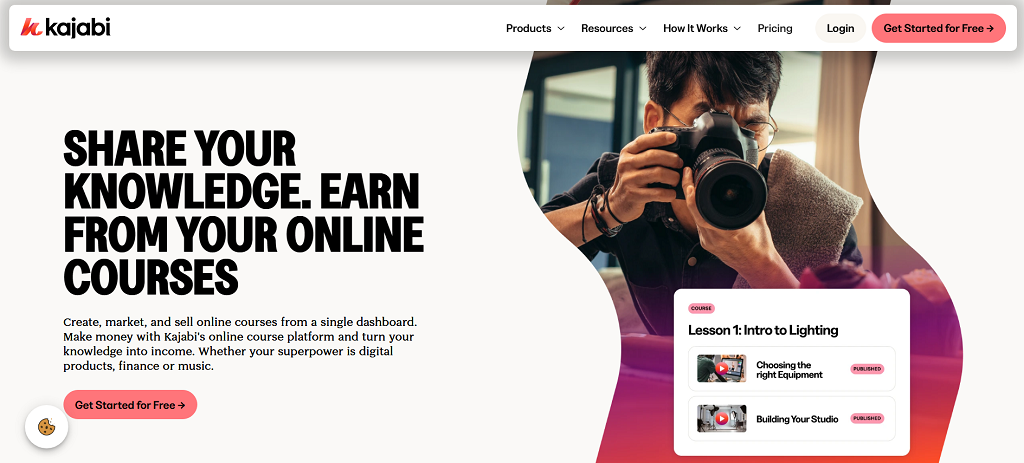
Kajabi is where a coach can build an entire learning and mentoring ecosystem under one roof. It’s not just lessons and videos — it’s the flow of how someone progresses over time. Coaches can map a journey: early orientation, skill-building modules, reflection checkpoints, group calls, and a community space that stays connected between sessions. It feels cohesive rather than scattered across apps.
This platform works well when your coaching has structure — when you guide people through phases, topics, or milestones. Kajabi lets you release content gradually and support clients with automated touchpoints so they don’t drift away between calls. The platform quietly keeps momentum going, which matters in transformational coaching.
What it does well:
- Lets you shape a branded environment that reflects your teaching presence
- Email automation that supports students without needing constant reminders
- Funnel + landing page tools for launching and enrolling
- Lessons, community, and coaching features arranged to work together
Things to keep in mind:
- There’s an initial setup curve
- Pricing makes the most sense once you’re taking clients consistently
- Works best for coaches who already have a framework or program outline
Best for:
Coaches offering structured, multi-stage transformation programs, group mentorship, wellness or mindset journeys, and educators shifting into community-supported coaching.
Mighty Networks — Community-Driven Coaching Spaces
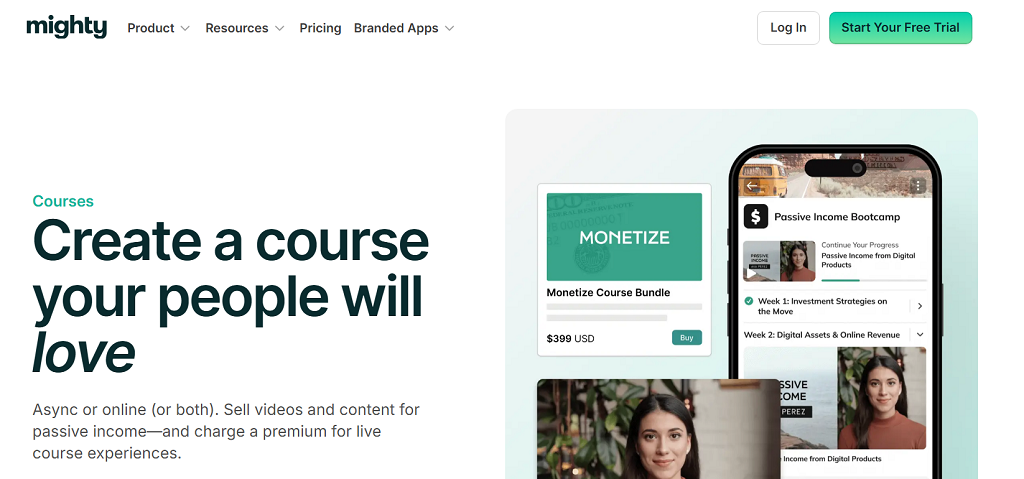
Mighty Networks’ goal revolves around creating an environment wherein people learn, converse, and thrive together. Rather than coaching consisting of teaching one to many in a classroom environment, Mighty Networks positions a ‘circle’ – a platform where people are there to encourage one another. Courses, live sessions, group chats, challenges, and event calendars all live inside a shared hub that feels social, not classroom-like.
This platform shines when your coaching depends on interaction. If your sessions spark conversations, if your clients benefit from comparing experiences, if progress accelerates when people feel less alone — Mighty Networks is built for that. The platform lets you create spaces for different subgroups, track engagement, and host live or recorded sessions without leaving the environment.
What it does well:
- Strong community and group interaction tools
- Feels like a private social app branded around your coaching identity
- Built-in live events, meetups, and learning spaces
- Works well for themed journeys, cohort coaching, and peer accountability
Things to keep in mind:
- Less structured for step-by-step curriculum than Kajabi or Thinkific
- The experience works best when you actively cultivate conversation
- Pricing tiers depend on community size and feature depth
Best for:
Community-oriented wellness coaches, empowerment coaches, peer support coaching circles, and anyone whose work thrives when clients learn together — not alone.
Thinkific — Course-Forward Coaching with Structured Learning
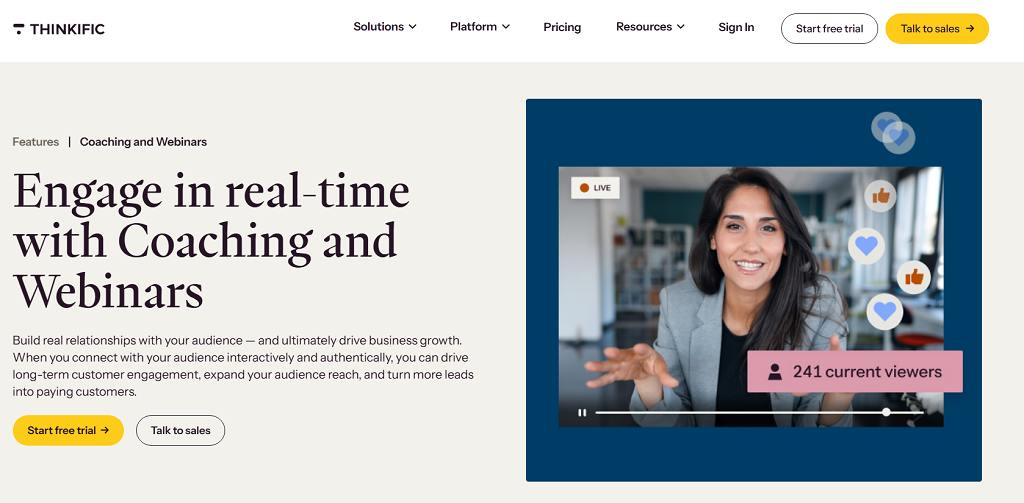
Thinkific is built for coaches who teach through process. If your work involves frameworks, models, exercises, or a curriculum that unfolds step-by-step, Thinkific gives you the structure to lay it out clearly. It feels like guiding someone through a path instead of improvising every session.
You create modules, upload lessons, add quizzes or reflections, and build momentum intentionally. Clients always know where they are and what’s next. For many people, that clarity is deeply reassuring.
Thinkific also supports group enrollments, private coaching add-ons, and bundled learning tracks — so the same content can work for 1:1 clients and group cohorts. This makes it easier to scale once your signature method is defined.
What it does well:
- Clean, structured lesson layouts that are easy to follow
- Tools for assessments, reflections, and learning checkpoints
- Supports hybrid business models (courses + coaching)
- Integrates well with email lists and scheduling tools
Things to keep in mind:
- Community features exist but are not the main focus here
- Works best when you already know what you’re teaching
- Coaching experience may feel more “classroom-like” unless balanced with live calls
Best for:
Coaches who teach transformations that benefit from sequence — language tutors, business mentors, health and nutrition coaches, skill-based trainers, mindset and habit coaches. Anyone who has a method and wants a structured place to guide someone through it.
LearnWorlds — Interactive Learning + Engagement Analytics
LearnWorlds is designed for coaches who want learning to feel active. Instead of clients just “watching videos,” you can turn content into an experience: highlights, annotations, interactive quizzes, and in-lesson prompts. It encourages people to engage, not skim.
Because of this, LearnWorlds is strong for teams and professional training environments — corporate leadership coaching, employee development, certification-based programs. The platform includes analytics that show where learners pause, rewatch, or get stuck. That helps coaches refine materials over time.
It also supports white-labeling — meaning the platform can look entirely like your brand, not just a page hosted on someone else’s domain.
What it does well:
- Interactive video tools that transform passive watching into active learning
- Certificates and assessments for professional or educational programs
- Robust analytics for improving curriculum performance
- Works well for multiple coaches or coaching teams
Things to keep in mind:
- More setup time compared to simpler systems
- Best suited for coaches offering structured or accredited learning pathways
Best for:
Education-focused coaches, team training companies, corporate leadership programs, HR-led learning initiatives, and coaches who want measurable outcomes rather than casual guidance.
Teachable — Easy Entry for New Coaches and Small Programs
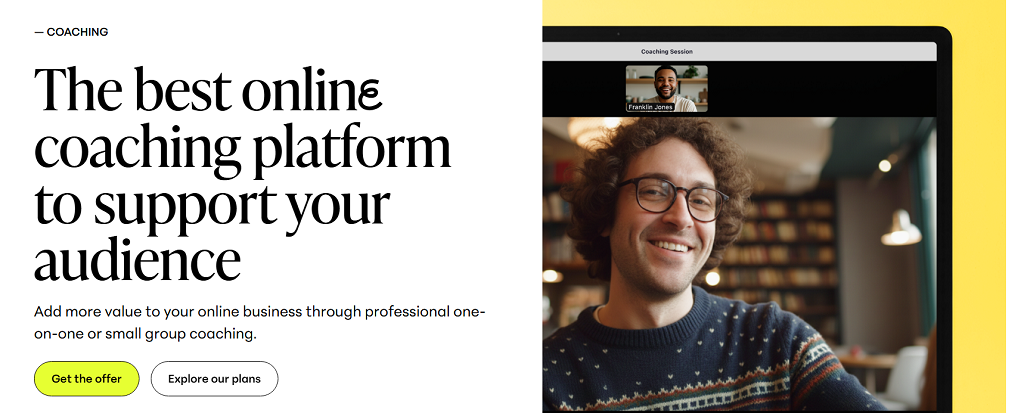
Teachable is simple, approachable, and forgiving — which makes it a comfortable place to start if you’re testing your first coaching offer. You can create lessons, host videos, build a basic sales page, and accept payments without needing technical skills. It’s a gentle on-ramp into coaching.
Think of Teachable as the place where your first paid program can exist. It lets you prove your method, gather testimonials, and refine your voice without being overwhelmed by features.
Teachable also supports 1:1 coaching sessions, group coaching packages, and bundled offerings — so you can expand gradually.
What it does well:
- Extremely beginner-friendly setup
- Clean course layouts that don’t distract from your teaching
- Smooth payment and enrollment experience
- Works well for small groups and first-time launchers
Things to keep in mind:
- Limited community engagement tools
- Personalization options are modest unless you upgrade
- Long-term scaling usually requires moving to a more customizable environment
Best for:
New coaches validating their first paid offer, creators adding coaching on top of content channels, or experienced coaches testing a new program before building a full ecosystem.
Noomii — Coaching Directory + Client Matching
Noomii is less about course-building and more about finding clients. It functions like a coaching marketplace where people search for support based on goals, personality, specialization, and approach. If you’re starting out — or switching niches — this can help you get early traction and conversations.
You create a profile, describe your method, your style, and who you help. Clients browse, compare, book intro calls, and begin working with you. Noomii also provides some business resources and tools to track sessions.
What it does well:
- Helps coaches get discovered without large social presence
- Makes early client acquisition less intimidating
- Great for market-testing your messaging and niche
- Built-in credibility boost from being in a recognized directory
Things to keep in mind:
- Not a place to host lessons, courses, or communities
- Works best as a lead source, not a full coaching home
- Long-term growth still requires building your own brand space
Best for:
Coaches who are new, transitioning fields, or refining their niche and message — especially those who want real client conversations quickly.
CoachingLoft — Client Relationship & Pipeline Management

CoachingLoft predominantly emphasizes the relationship-based aspect of coaching. It’s designed for coaches who are working with the same set of clients over weeks or months and need to monitor progress, goals, sessions, homework, accountability, or other types of follow-ups. It’s almost like a CRM but specifically for coaches.
The tool assists you in staying organized in terms of session schedules, note-taking, development milestones, common goals, and following up. Essentially, life coaches, executive coaches, wellness coaches, or other individual development facilitators would benefit from using this tool.
What it does well:
- Goal tracking + client progress dashboards
- Structured follow-ups and accountability workflows
- Session documentation and shared plans
- Works smoothly for recurring and long-term coaching relationships
Things to keep in mind:
- Not built for community or group coaching
- Works best alongside a platform for publishing lessons or hosting video
Best for:
Coaches with steady client loads who need a reliable, organized, professional coaching workflow environment — especially those managing multiple clients at once.
The Benefits of Online Coaching for Growth & Retention

Online coaching has grown because people want support that fits into the rhythm of real life. Not a once-a-month appointment. Not a seminar they forget a week later. Ongoing guidance, inside a space that feels personal and consistent. The best online coaching platforms help create that feeling — a sense that coach and client are actually walking together, not meeting on scattered apps and disconnected tools.
When coaching takes place in one environment, progress feels continuous. Clients can reflect on past sessions, check messages, track their commitments, and show up with more awareness. Coaches get to see patterns, not isolated moments. The relationship becomes a shared timeline.
And this is where online coaching becomes more than “video calls on the internet.” It becomes a relationship system.
Why Clients Return
Clients stay when the support feels real. Not dramatic — real. They want someone to talk to when they’re stuck, someone who remembers where they were last time, someone who takes their goals seriously.
Things that make people continue:
- A predictable routine
- A private place to communicate
- Gentle accountability instead of pressure
- The feeling that their progress matters
The online coaching platforms that work best are the ones that make the journey visible. Notes, messages, shared documents, session logs — these create continuity. A client can look back and see how far they’ve moved. That sense of progress makes them want to keep going.
Why Coaches Earn More
For coaches, moving online expands what’s possible. Instead of being limited by physical location or travel time, they can work with clients across cities and time zones. Instead of only selling one-on-one sessions, they can offer group programs, voice-note mentorship tiers, or ongoing community access. This is how sustainable business models form.
The best coaching platforms support this growth with structure: scheduling, billing, messaging, resource libraries, call rooms. Coaches don’t waste hours sending reminders or chasing invoices. They spend time on the work itself — guiding, refining, communicating.
Some coaches start by offering weekly sessions, then grow into programs with shared lessons and group calls. Others focus on small accountability circles. Different methods work. The key is having a space that supports the method you teach.
A coach platforms ecosystem should feel like your practice made tangible. When that happens, raising prices or expanding your offerings feels natural — not forced. And the best online coaching platform for you will be the one that matches how you already coach, not the one with the most technical features.
Build a Custom Coaching Platform with Scrile Stream
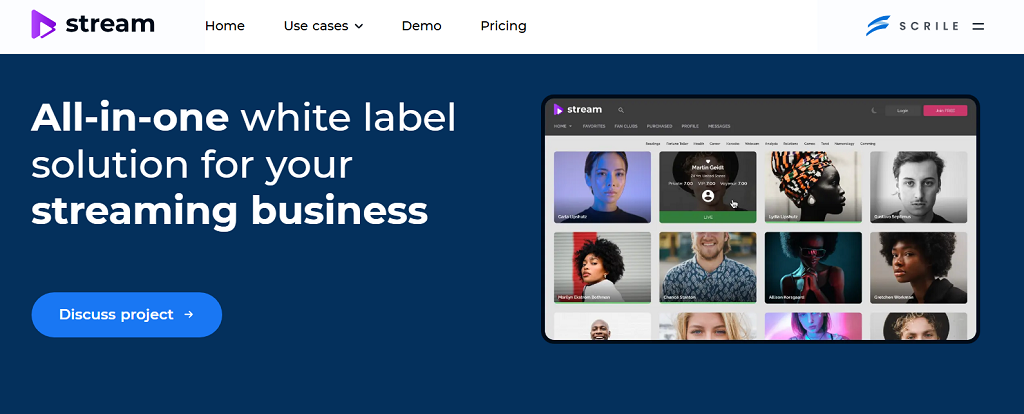
As a coaching practice grows, the experience you provide becomes just as important as the guidance itself. When sessions happen on one platform, messages on another, documents in a random cloud folder, and community chats in a social app, clients start to feel like they’re juggling the process instead of living inside it. A coaching environment works best when everything is in one place and feels intentional.
Scrile Stream is built for that. It is not a marketplace and not a pre-designed software template. Instead, Scrile Stream is a white-label development service that creates a coaching platform designed around your method, your pacing, and your brand personality.
You choose how the environment works. For example, your platform can include:
- Private video rooms for one-on-one sessions
- Group coaching spaces and live workshops
- Membership or subscription tiers
- Resource libraries for lessons, replays, and worksheets
- Private or group chat channels for ongoing check-ins
Because the visual design and workflow reflect your voice, clients don’t feel like they are logging into a generic tool. They feel like they are entering your coaching world — a space with a clear tone, structure, and sense of belonging.
One key difference from many of the best online coaching platforms is ownership. With Scrile Stream, you are not renting space inside someone else’s system. You use your own domain, keep control of your client data, and decide how your community grows. There are no algorithm dependencies or marketplace competition layered on top of your work.
This matters because coaching is personal work. Trust grows when the environment feels steady, familiar, and made with care. When the coaching platform feels like home, clients stay longer, progress is easier to track, and relationships deepen naturally.
Scrile Stream provides the technical foundation. You shape the experience, the culture, and the journey.
The result is a coaching ecosystem that supports growth instead of limiting it.
Conclusion
The best online coaching platforms are the ones that support the way you work, not the other way around. Coaching has always been about relationship and continuity — being present in someone’s growth over time. A platform should make that easier, calmer, and more connected.
Before choosing a platform, it’s helpful to get clear on your coaching rhythm. Some coaches build longer structured programs, others focus on direct conversation-based support, and many blend multiple formats together. When the tools align with the way you guide people, sessions feel smoother and clients engage more naturally.
When you’re ready to build a coaching space that reflects your style, language, and brand, Scrile Stream can create it with you. It’s a custom, white-label solution — your domain, your identity, your community. The platform becomes an extension of your practice, not a container you have to squeeze into.
If building something long-term and truly yours feels right, reach out to the Scrile Stream team.
FAQ
What is the best platform for online coaching?
Different coaching styles need different setups. If your program uses structured lessons, platforms like Kajabi, Thinkific, LearnWorlds, or Teachable work well. Coaches who rely on group support and shared discussions often prefer Mighty Networks. If discovery and client intake are the priority, Noomii helps coaches get found. For ongoing client tracking and session notes, CoachingLoft offers built-in progress management. The best fit is simply the one that matches the way you already coach.
What is the best online life coach?
“Life coaching” can mean emotional support, career clarity, confidence-building, or relationship guidance. Popular coaching services include Lemonaid Healthcare, Ama La Vida, Plumm Health, Blush Life Coaching, Man-UP! Life Coaching, BetterUp, and Couples Therapy Inc. Each one approaches growth differently, so the best choice is the one whose style feels supportive and aligned with your goals — not the one with the loudest marketing.
Do online coaches make money?
Yes. Online coaching has low overhead and flexible pricing. Many coaches offer a mix of one-on-one sessions, group programs, and membership communities. When the support is consistent and the experience is well-structured, clients stay longer — and that’s what creates stable income.


Can you be more specific about the content of your article? After reading it, I still have some doubts. Hope you can help me.